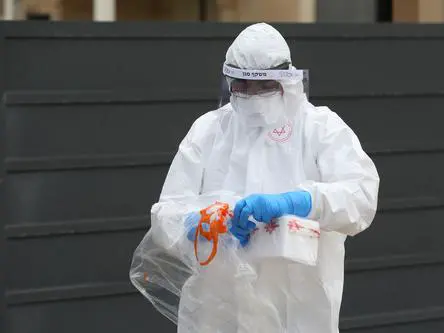The Israeli Defense Forces (IDF) are playing an increasingly larger role in the country's battle against the spread of COVID-19.
The army has not only contributed to enforcing stringent lockdown measures in Israeli cities, but also deploying boots on the ground in civilian capacities. The aim is to help alleviate the burden on civil society wherever possible.
Israel's Ministry of Health said on Thursday that the total number of confirmed cases of COVID-19 in the country has risen to 6,857, of whom 36 have died.
One of the projects led by the IDF is "coronavirus hotels."
Under the direction of the Defense Ministry, the IDF took over eight hotels around the country and transformed them for dual use.
Some of the hotels are used for people who need to be quarantined. Other hotels are used as care centers for people who have tested positive for COVID-19 but in good condition.
One of the leading concerns in Israel is that a sudden influx of patients rushing to Israeli hospitals will put the health system under pressure.
Among the Organisation for Economic Co-operation and Development countries, Israel is ranked in one of the lowest positions in the number of hospital beds per capita.
By lessening the burden, the IDF is freeing up beds and enabling medical staff to give needed attention to more critical patients.
Eli Kenigsberg, commander of the Jerusalem facilities and deputy commander of the Jerusalem and Center District at the Home Front Command, is in charge of three such hotels in Jerusalem including one for quarantine and two for patients. Currently, there are about 400 people in the facilities.
As a reservist, ahead of the fight against COVID-19, Kenigsberg owns a chain of handbag and luggage stores and he was called to duty three weeks ago.
"This is a first-time event for everyone," Kenigsberg told Xinhua.
"I am used to be called for duty during wars and this is definitely different, but without a doubt, this is a large-scale event but we are ready for every mission," he added.
Kenigsberg believes that more facilities will be open in the near future, as the number of confirmed cases of the coronavirus is rising.
Such hotels are now staffed by the hotel personnel who continue to give services and by soldiers who are in charge of coordination between the different authorities.
"We feel that we are needed and we are very proud to undertake this mission," Kenigsberg said.
There also soldiers who help take care of children the medical staff who are in the frontlines to combat the virus.
Yaarit Gozlan, lieutenant colonel, said that her unit created 46 centers around the country in which her soldiers, approximately 300 of them, provide daycare for children of medical staff.
Over 1,000 children aged four to twelve are under their care.
"It is an incredibly important mission with great value," she told Xinhua.
"It is very emotional to see the parents leave us their kids and continue to fight against the virus," she added.
The activities are held under the restrictions mandated by the Israeli Health Ministry.
"We understand that the army has high capabilities, together with its strong ties to Israeli society. This mission is very natural for us," Gozlan told Xinhua.
"The frontline is now manned by the medical staff and we are here to support them and to free them to do their jobs in order to help the people of Israel," she said.
"I am so proud to do this because I know how important what I am doing," said Sargeant Adi Koren, who is in charge of a group of six-year-old children near the Sheba medical center in Tel Aviv.
"It is a complex situation," Koren told Xinhua.
"It is very challenging but fun. We need to be very creative to find activities that do not involve direct contact between us," Koren added.
Throughout the crisis, Israeli Defense Minister Naftali Bennett has called for greater involvement of the IDF.
Earlier this week, the army contributed a battalion of 700 unarmed soldiers to help police in manning roadblocks that were set-up to reduce travels between cities.
The army has also set up a national call center where citizens can ask any COVID-19 related questions and refer to the relevant authority.
(by Keren Setton)
 简体中文
简体中文













